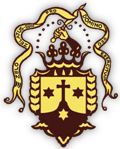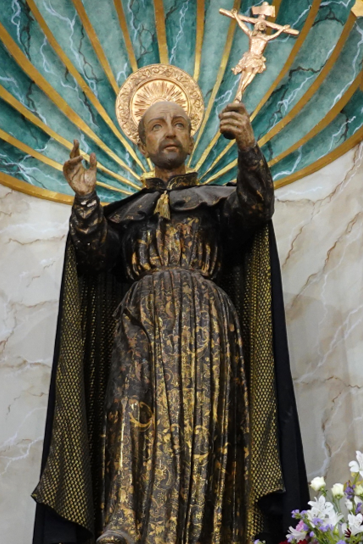
Messages given by Saint Ignatius of Loyola to Clemente Domínguez y Gómez,
today Pope Saint Gregory XVII, the Very Great
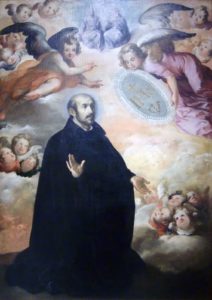 Święty Ignacy z Loyoli
Święty Ignacy z Loyoli
“Moi najdrożsi synowie Karmelici Świętej Twarzy i także moi kontynuatorzy, jako że wam przypada walka przeciwko aktualnym herezjom. Wy także otrzymaliście święty depozyt Jezuitów; jako że ci, którzy jeszcze nazywają się Jezuitami lub Towarzystwem Jezusa, w większości odłączyli się; tak niszczą moją Pracę. Więc w was, pokładam moją nadzieję na zmieszanie pysznych. Na zmieszanie mądrych i rozsądnych, Zakon Karmelitów Świętej Twarzy jest także Towarzystwem Jezusa. Jako że ci, którzy naprawiają Twarzy Jezusa, są Jego autentycznymi towarzyszami. Nie jest przypadkiem, że Anioł, który mnie kierował, kieruje teraz waszego Założyciela i Ojca Generała.
Nie zapominajcie, że jesteście w miejscu mojego nawrócenia. O tym powinniście medytować dużo. Nawrócenie musi być waszym Krzyżem prowadzącym na drodze. Potrzebne jest autentyczne nawrócenie, wyrzekając się świata. Trzeba zostawić wszystko da miłości Chrystusa. Dla tej wielkiej pracy liczcie na moją pomoc, wzywając mnie często, jako jednego z waszych Patronów.
Patrzcie na Towarzystwo Jezusa jak postępowało przed laty. Byli zawsze najbardziej przygotowani, najlepszymi dyrektorami duchowymi. Zawsze bardzo wychowani i zawsze prześladowani przez społeczność, wliczając, wśród drapieżnych wrogów, masonów. Teraz odwrotnie, Towarzystwo Jezusa ma wszędzie przyjaciół; ponieważ masoni go zinfiltrowali; zaczynając od zdrajcy aktualnego Prepositora Ojca Generała, Ojca Arrupe, który niszczy Zakon; on ma bardzo dobre stosunki z krajami za Żelazną Kurtyną.
 Trzeba, aby w waszych lekturach, zajmowały dobre miejsce prace Towarzystwa Jezusa, jako że wy jesteście kontynuatorami.
Trzeba, aby w waszych lekturach, zajmowały dobre miejsce prace Towarzystwa Jezusa, jako że wy jesteście kontynuatorami.
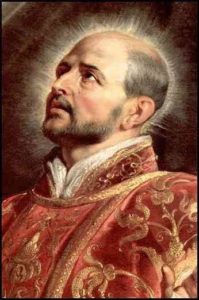
Za wskazaniem Jego Boskiego Majestatu, Naszego Pana Jezusa Chrystusa, w Zakonie Świętej Twarzy, powinna nakazywać Reguła obowiązkowa, czytania we wszystkie dni części Przekazów z El Palmar dane waszemu Założycielowi i Ojcu Generałowi. Szkoda, że tracicie czas czytając inne objawienia, czasem wątpliwe, a nie znacie mistycznej wielkości waszego Założyciela; który chociaż ma wiele wad i niedoskonałości, żyje w najwyższym stopniu mistycznym. Może być zaliczony do mistyków, którzy otrzymali największe łaski. Szkoda, że żyjąc blisko niego, nie uczycie się. Zawsze we wszystkich Zakonach Religijnych rozmyślano o życiu swoich Założycieli. Myślcie! Medytujcie! Jakie objawienie jest tak wielkie jak te w El Palmar de Troya. Nie znajdziecie w jakimkolwiek innym miejscu. Tylko Życie Chrystusa na Ziemi Świętej przewyższyło Dzieło w El Palmar.
Ja wam obiecuję ustawiczne wstawiennictwo przed Tronem Najświętszej Dziewicy Marii, dla dobra i pomyślności Zakonu Karmelitów Świętej Twarzy; zwanego także, Krzyżowców, a także Towarzystwa Jezusa. Wzywajcie mnie, a znajdziecie moją pomoc jako Patrona. Was błogosławię.”.
Biography of Saint Ignatius of Loyola
31 de julio
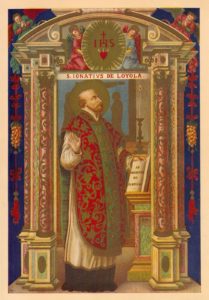 Presbyter. Religioso. Founder. Patriarch. Doctor. Great Mystic. Protector of the Carmelites of the Holy Face.
Presbyter. Religioso. Founder. Patriarch. Doctor. Great Mystic. Protector of the Carmelites of the Holy Face.
One of the great pillars of the Catholic Counter-Reformation in an age of great heresies and moral corruption, he was born in Loyola, Guipúzcoa, Spain, on the 25th of September in the year 1491 into the bosom of a noble family. He was the last of the thirteen children born to Beltran Ibáñez de Oñaz y Loyola, and Marina Sánchez de Licona. He had a deeply Catholic upbringing. His impassioned youth, together with longings for glory, caused him to lead a worldly life. He had a sturdy and valiant character, very ready to undertake great things, and was clever and prudent.
In 1517 he took up a military career, and entered the service of the viceroy of Navarre, Duke of Nájera, and distinguished himself for his valour and military skill. In the year 1521 he fought against the French when they invaded Navarre to wrest it from the Spanish crown, and in the defence of Pamplona was wounded in the leg by enemy troops, completely routed by the Spanish forces. As consequence of the wound, he had to undergo very painful treatment, for the bones had set badly and had to be put back in place, without him saying a word or giving any other sign of pain other than tightly clenching his fists. To leave the legs equal, he had the bone shortened. To do this they wanted to tie him down, but he refused. Then they had to stretch the leg on a kind of trestle or rack.
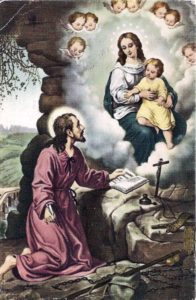
The consequences of this providential wound were transcendent for him. During his convalescence, the reading of ascetic books and biographies of saints, and his response to God’s graces, moved him to change his ideals, and give himself up to the service of Christ and the Church. He said: “Saint Francis did this, so I have to do it. Saint Dominic did this, so I have to do it as well.”
A man of iron character and indomitable will, in 1522, scarcely recovered, he went on pilgrimage to the sanctuary of Montserrat in Barcelona, where he exchanged his gentleman’s dress for a pilgrim’s smock of sackcloth, and swore to consecrate his life to the exaltation of Catholicism. Afterwards he retired to a cave in the nearby town of Manresa, giving himself up to long hours of prayer and rigorous penance. Then, following a brief stay in Rome, Italy, he set sail for the Holy Land, reaching Jerusalem in September of the same year 1522. There he made known to the Franciscans his desire to found an association which, spread throughout the world, might counteract impiety and heresy. The Franciscans treated him coldly, and even forbade him to stay in Jerusalem. On his return to Spain in 1524, he began ecclesiastical studies in order to be ordained Priest. Following two years of Latin studies in Barcelona, in 1526 he headed for the University of Alcalá de Henares, Madrid, where he began his philosophical studies. While he was studying in Alcalá de Henares, they suspected him of belonging to the fanatical illuminati, who, engulfed in supposed divine revelations, sowed the most ridiculous errors.
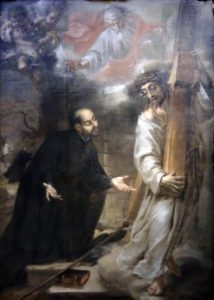
Denounced to the Holy Inquisition, he was tried and imprisoned for about two months. His innocence recognized, Saint Ignatius passed from Alcalá to the University of Salamanca to continue his studies, where he was also accused, tried, and imprisoned for a further twenty-two days. Absolved by the Church authorities, he left that University and headed for that of the Sorbonne in Paris, France, where he was also accused of being a secret heretic, tried and absolved. In the College of Saint Barbara in Paris University he completed his studies in philosophy and Theology, graduating in 1534. In this college he shared a room with two student companions: Saint Francis Xavier and Saint Peter Faber.
In Paris he eventually gathered about himself six companions, who formed the nucleus of the association he had been dreaming of for some time. They were: the Spaniard Saint Francis Xavier, the Savoyan Saint Peter Faber, the Spaniards Saint Diego Laínez, Alphonse Salmerón and Nicholas Bobadilla, and the Portuguese Simon Rodríguez. On the 15th of August 1534, in a chapel on Montmartre, they took vows of poverty and chastity, to which they added that of going to Jerusalem to spend themselves in the conversion of the heathen. To do so they were to wait one year in Venice for the embarkation, and if the occasion did not materialize, they were to place themselves under the Pope’s orders, for Saint Ignatius’ preferred virtue was obedience.
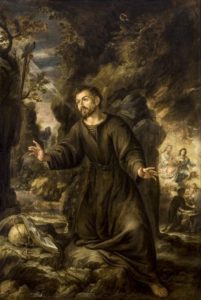 By January 1537 they found themselves in Venice; but given the war between this republic and the Turks, they were unable to take ship, so they headed for Rome to place themselves at the disposition of the Roman Pontiff, at the time Saint Paul III the Great. During their stay in Italy, the number of companions increased. Christ inspired Saint Ignatius with the idea of transforming the association into a religious institution, and he decided to work for its approval. He was ordained Priest in 1537. Towards the middle of 1538, the association took the name of Company of Jesus. Pope Saint Paul III gave his approbation to the new Religious Order on the 27th of September 1540, the official date of the foundation of the Company of Jesus, and Saint Ignatius was proclaimed General of the new Order in 1541. Besides the third vow of obedience, indispensable in religious life, Saint Ignatius added a fourth vow: that of absolute obedience to the Sovereign Pontiff in any work the Pope might wish to commend to them, so that the Jesuits became soldiers at the service of the Pope. Their way of life was that of regular clerics, but with different emphases in the way of doing apostolic work. Soon the saintly Founder sent his sons out to work among the faithful, and also in the conversion of the heathen, including under this last name, not only idolaters and muslims, but all those who were separating from Catholicism.
By January 1537 they found themselves in Venice; but given the war between this republic and the Turks, they were unable to take ship, so they headed for Rome to place themselves at the disposition of the Roman Pontiff, at the time Saint Paul III the Great. During their stay in Italy, the number of companions increased. Christ inspired Saint Ignatius with the idea of transforming the association into a religious institution, and he decided to work for its approval. He was ordained Priest in 1537. Towards the middle of 1538, the association took the name of Company of Jesus. Pope Saint Paul III gave his approbation to the new Religious Order on the 27th of September 1540, the official date of the foundation of the Company of Jesus, and Saint Ignatius was proclaimed General of the new Order in 1541. Besides the third vow of obedience, indispensable in religious life, Saint Ignatius added a fourth vow: that of absolute obedience to the Sovereign Pontiff in any work the Pope might wish to commend to them, so that the Jesuits became soldiers at the service of the Pope. Their way of life was that of regular clerics, but with different emphases in the way of doing apostolic work. Soon the saintly Founder sent his sons out to work among the faithful, and also in the conversion of the heathen, including under this last name, not only idolaters and muslims, but all those who were separating from Catholicism.
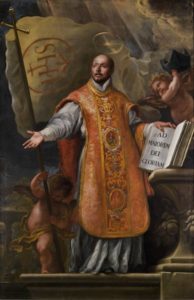 Saint Ignatius excluded Church dignities from his sons, only allowing them when expressly ordered by the Pope. The labour of the Company of Jesus was extraordinary, not only in Europe, but also in China, Japan, India, the Spanish colonies in America, and so forth. His apostolic and educational work had enormous repercussions, and was an efficacious instrument in the hands of the Church for carrying out the true reform, the containment of protestantism and the reconquest of some of the territories invaded by heresy. With the foundation of the Company of Jesus, Saint Ignatius contributed to Catholic Reform with two vital elements: a hardy spirituality and a Christian education. The principal object of the Company was the greater glory of God, to which they were to aspire by way of personal sanctification and that of their neighbour.
Saint Ignatius excluded Church dignities from his sons, only allowing them when expressly ordered by the Pope. The labour of the Company of Jesus was extraordinary, not only in Europe, but also in China, Japan, India, the Spanish colonies in America, and so forth. His apostolic and educational work had enormous repercussions, and was an efficacious instrument in the hands of the Church for carrying out the true reform, the containment of protestantism and the reconquest of some of the territories invaded by heresy. With the foundation of the Company of Jesus, Saint Ignatius contributed to Catholic Reform with two vital elements: a hardy spirituality and a Christian education. The principal object of the Company was the greater glory of God, to which they were to aspire by way of personal sanctification and that of their neighbour.
Saint Ignatius of Loyola died in Rome on the 31st of July 1556. He was beatified by Pope Saint Paul V the Great on the 17th of July 1609.
Canonized by Pope Saint Gregory XV the Great on the 12th of March 1622. Declared Doctor of the Church by Pope Saint Gregory XVII the Very Great on the 3rd of October 1978.
